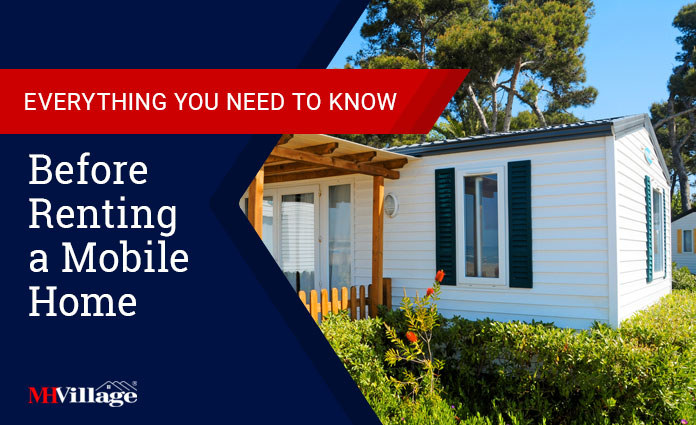When it comes to renting a mobile home, there’s quite a bit you should think about before committing to signing that lease. Researching the market, the available options, price considerations, along with the different responsibilities required of both the tenant and the owner might seem daunting, but making an effort to learn about how best to navigate the process can save time and trouble in the long run.
Whether you’re dead set on renting a mobile home or simply exploring your options, here’s everything you need to know before renting a mobile home.
Why Rent a Mobile Home?
With more than 22 million people in the United States living in manufactured homes, it’s a widely accepted and generally affordable option for people looking to have a space to call their own. From owning to renting, there are a few different models for residing in a mobile home.
You might choose to:
- Own your mobile home and own the land it’s on.
- Own your mobile home and rent the land it’s on.
- Rent your mobile home and rent the land it’s on.
Renting a Mobile Home vs. Renting an Apartment
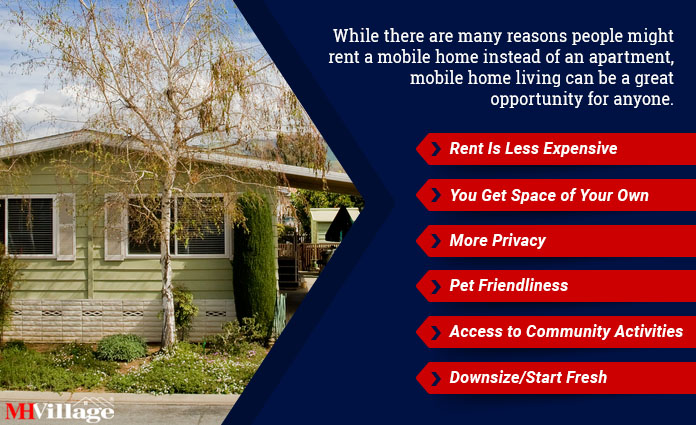
While there are many unique reasons why people might choose to rent a mobile home instead of an apartment, mobile home living can be a great opportunity for millennials, retirees, or anyone in between.
- Rent Is Less Expensive: Renting a mobile home is generally less expensive than renting an apartment. For those looking to maximize their savings, or who have access to a place of their own that they wouldn’t be able to afford otherwise, renting a mobile home is an empowering option.
- You Get Space of Your Own: Apartments don’t always come with outdoor space, let alone private outdoor space. Renting a mobile home allows you to have the luxury of personal space that apartment living doesn’t.
- More Privacy: Apartment living often comes with thin walls and lots of unintentionally overheard conversations. It also involves navigating through several unavoidable areas of shared space (lobbies, stairwells, grounds, etc.) since tenants all reside in the same building or building complex. Mobile home living gives residents the opportunity to live in a freestanding space that’s just for them.
- Pet Friendliness: It’s quite difficult to find a pet-friendly apartment; one recent study found that only nine percent of rental units allow companion animals with no restrictions as to breed or size. In addition to limited availability, apartment living generally doesn’t offer areas for pets to play or be walked.
- Access to Community Activities: If the mobile home is within a mobile home park, the community may host activities to get together and enjoy the company of other residents. Time at the pool or celebrating a holiday party gives residents the chance to get to know one another if they so choose.
To Downsize/Start Fresh: Renting a mobile home is a fantastic option for individuals or families looking to downsize from a traditional home or start fresh in any way. For those who are conscious about the environmental impact of taking up a lot of space, renting a mobile home could be a step toward a more minimalist lifestyle.
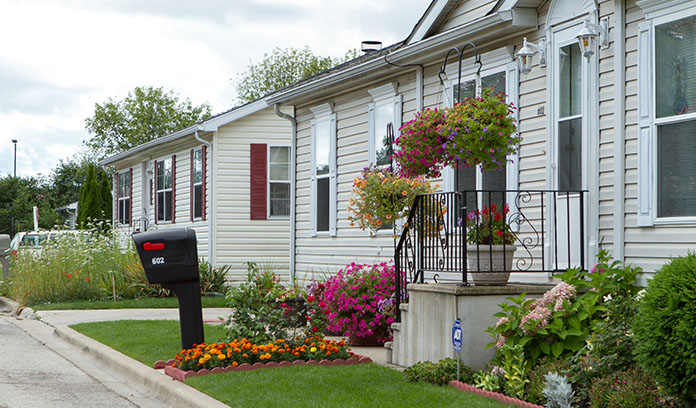
In short, renting a mobile home provides an opportunity to have your own space and privacy, at a price that is significantly more affordable than a mortgage or the rent of an apartment.
Understanding the Costs of Renting
Unlike with buying, someone renting a mobile home would not be transporting the home to a particular location; rather, they would be exploring options that have already been installed somewhere. When renting a mobile home, there are a few different options for how you can secure your rental.
In general, you can either:
- Rent a mobile home that resides on private property.
- Rent a home and its corresponding lot within a mobile home community.
- Rent a home owned by someone else in a mobile home community.
Several factors can affect the rental price of a mobile home, including size/type, location, and timing of your search.
- Size/Type: As with most residences, larger mobile homes will cost more to rent than smaller ones. Depending on the square footage, details of the floor plan, and materials used, the rental price can vary.
- Location: Certain areas or communities are more desirable to live in than others. Locations that are close to city centers, or which have a higher cost of living in general, tend to command higher rental costs.
- Timing: Across geographic boundaries, prices of homes or rentals are generally less expensive in the winter, due to decreased demand during the time period. Intuitively, people are more often willing to search for a new residence when the weather is nice, and this makes competition (and prices) higher in the spring and summer months.
While the above factors can certainly affect rental rates, mobile home rental rates average at around $500 per month, according to original research from MHVillage. This is substantially cheaper than the median rent of a one-bedroom apartment in the U.S., which is $958.
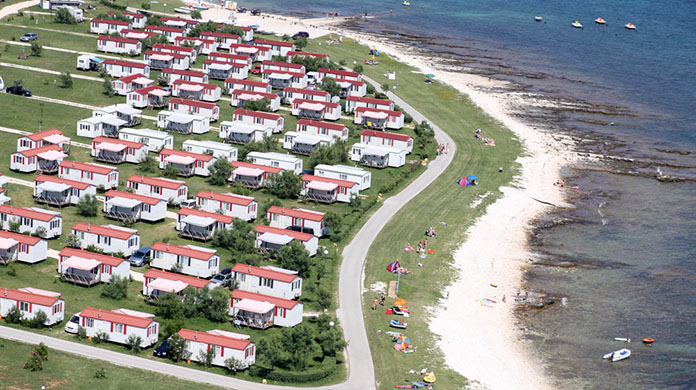
Mobile Home Affordability
If you’re wondering why the cost of renting a mobile home is so affordable, it largely has to do with the way the manufacturing process is standardized.
In 1976, the United States Department of Housing and Urban Development (HUD) released a series of standards and regulations in an effort to ensure the safety of manufactured homes. Now, in order to be considered a HUD-compliant home, a mobile home must be constructed under controlled circumstances in a manufacturing plant in one or more sections on a permanent chassis, to ensure streamlined transportability to where they will eventually be placed.
Paying Lot Rent
If you’re renting a mobile home directly from a mobile home community, you will be expected to pay a unique expense called the lot rent. Lot rent is essentially renting the land that lives below your mobile home. This fee helps offset the cost of maintaining the land, along with its utility connections.
While some no-frills parks rent just the land, other mobile home communities offer a variety of additional amenities that are designed to enhance the homeowners’ experience and create a sense of belonging. More exclusive mobile home communities with luxury amenities will generally command a higher rental price than those with more baseline offerings.
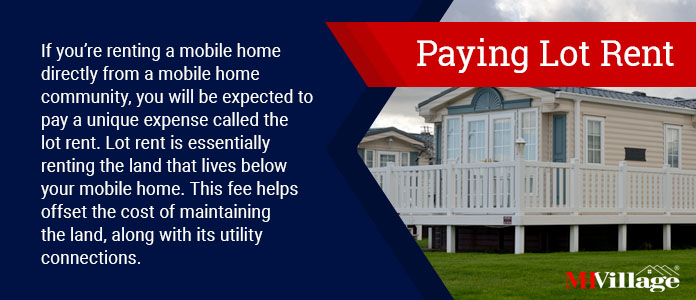
Some factors that might affect your lot rent price include:
- Community pool and/or clubhouse
- Gardens or a community park
- Exclusive, age-restricted communities (for example, a retirement community with many organized events and shared facilities)
- Grounds maintenance
- Accessibility to a city center with entertainment or shopping
- Infrastructure upgrades
Some mobile home communities may choose to loop the mobile home rent and the lot rent together into one rental rate, and others will divide the two out. Both are generally expected to be paid monthly by the tenant, however.
Additional Expenses
Not all mobile home rent prices include the cost of utilities in their rental or lot rates. Additional fees and expenses to consider before renting a mobile home include:
- Water, heat, and gas
- Sewage, garbage pickup, and general maintenance
- Television, electricity, cable and phone service
- Having a pet with you
How to Rent a Mobile Home
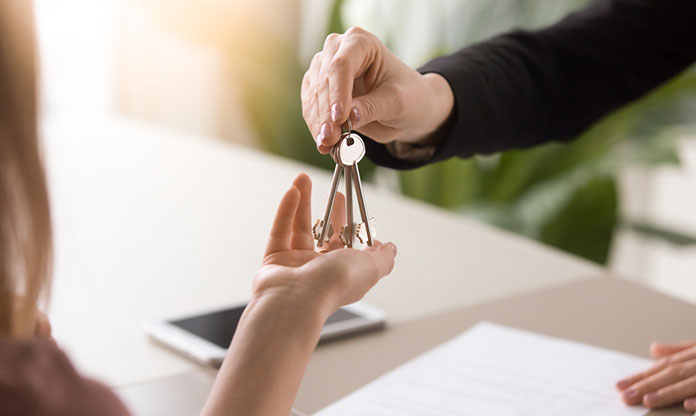
When you decide to rent a mobile home, beginning the process of finding a place that fits your lifestyle can feel like a colossal undertaking. Especially if you’ve only ever rented an apartment, or have never rented at all, you may feel particularly confused about how to rent a mobile home.
Searching for a Home to Rent
Before diving into a search, it’s important to take the time to ask yourself questions that help narrow down your results. Where are you looking to move? What is your rental budget? What types of amenities are important to you? How soon do you need to move in? Eliminating irrelevant listings up front will allow you to browse only the ones that are truly options.
If you know someone from a mobile home community you’re interested in, you might choose to ask around to learn whether units are available. You might also look through listings on units in communities that are available for renting. No matter how you choose to explore your options, you’re one step closer to finding the right choice for you.
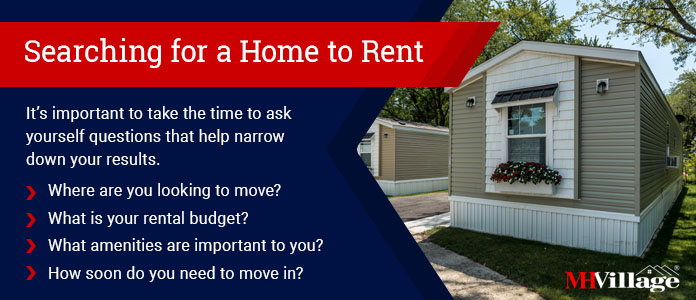
Signing the Lease
After finding an ideal mobile home to rent, you’ll need to go through an application process and will, hopefully, be approved to move into your new home! Before you get the keys and officially move in, you’ll be asked to sign a lease agreement.
Here is some of the information that a lease agreement may typically include:
- The names of the tenants
- Cost of the rent and description of the space
- A listing of deposits or fees requested by the owner/management
- Limits on occupancy (meaning, how many others besides those who have signed the lease can reside in the space)
- Indication of when and why the landlord would need to enter the mobile home
- The lease term (for mobile homes, typical terms are 6 months, 12 months, and 24 months)
- Terms and conditions regarding rent increases and the notice that must be provided
- Expectations of the tenant and the landlord on addressing general maintenance and repairs
- Rules regarding pets and/or guests
- Information on how to pay rent and repercussions if rent is not paid on time
- General rules about the habitability of the mobile home and landlord’s requirements to maintain them
- Rules of the mobile home community, and a description of behaviors or activities that may lead to the tenants’ eviction
Mobile home parks are required to adhere to state rules and regulations to ensure the safety of its residents. For example, the New York State Department of Health details 13 sections worth of guidelines—including utilities, fire safety, application, supervision and more—for the legal operation of a mobile home park within the state.
Before signing your lease, read through the agreement thoroughly, as well as through the tenant laws for your state to ensure that your mobile home community management is providing you with an agreement that’s in compliance with them.
What Else to Look For
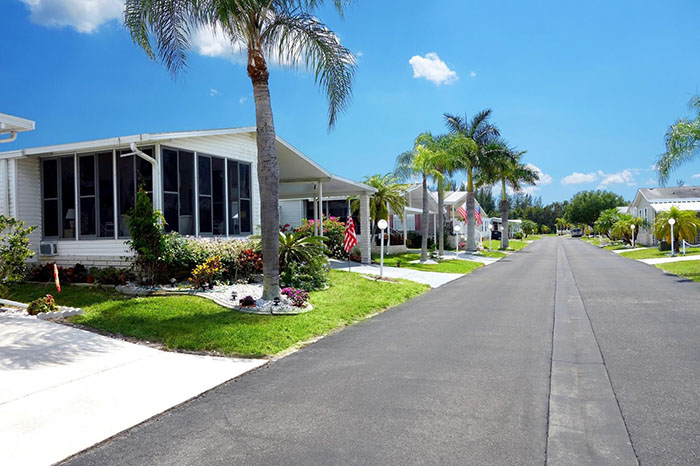
Before everything is officially official, it’d be helpful to do another thorough check of your mobile home and the property to ensure it is ready for your arrival. Whether you choose to have an inspector come once more or do additional assessments yourself, you’ll want to make sure that the space is habitable.
- Make sure you have your keys.
- Check that the property is clean enough for move-in.
- Assess the space for any lingering health and safety issues.
- If any issues were uncovered during an initial inspection, make sure they have been properly dealt with.
- Meet with the landlord for clarity on the lease agreement.
- Take photographs, or make a note of any minor damages (scuffed countertop, chipped paint, etc.) that was already there upon your arrival.
- Check that all of your utilities (heat, water, electricity, telephone line, cable, etc.) are in proper working order.
You’ll also want to feel confident that you’re completely clear on your expectations as a tenant, and also those of your landlord. In general, your landlord should be responsible for ensuring the mobile home park is habitable and safe for its residents, while each tenant should make a conscious effort to be a respectful member of the community.
Enjoying Your Mobile Home Rental
After you’ve found the right mobile home for you and have gone through the process of applying and eventually signing a rental agreement, it’s time for you to get to enjoy your space! Now’s your chance to introduce yourself to your neighbors, make use of the community’s amenities, and even start planning any minor upgrades to make your space feel more like home.
While the process of searching for and moving into a mobile home rental can feel arduous, it’s not too different from most other rental processes. With a bit of research, a clear understanding of what you’re looking for, and some time spent learning about your rights as a tenant, you’ll be on your way to renting in no time!
